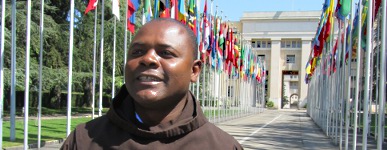FI at the 3rd UN Human & Business Rights Forum
Franciscans International (FI) participated actively in the United Nations’ Annual Business and Human Rights Forum.
Franciscans International (FI) participated actively in the United Nations’ Annual Business and Human Rights Forum. The Forum’s aim is to serve as a key annual venue for stakeholders from all regions to “discuss trends and challenges in the implementation of the Guiding Principles and promote dialogue and cooperation on issues linked to business and human rights. Because of its work linking advocates on the field with experts in human rights on the international scene, FI was able to bring the grassroots perspective on Business and Human Rights to a wide audience of decision makers.
FI co-hosted two very well attended side events; one on improving access to remedy in extractive industries and the other on improving the protection and participation of land and environment defenders in business initiatives.
The first side-event was convened in partnership with Fastenopfer, ACT Alliance, Al-Haq, International Catholic Center of Geneva, CAFOD, CIDSE and CARITAS. Mr. Henri Muhiya, a Franciscans International partner from the Episcopal Commission on Natural Resources in the DRC, presented various concrete cases illustrating the problematic situation of business misconduct as part of his intervention on the panel. One case focused on the delocalization of a local population in the Oriental Province of DRC, that demanded a re-evaluation of compensation and the improvement of living conditions. The company’s response was found unsatisfactory and lead to peaceful demonstration, but the police intervened with force. Other case studies were related to the polluted living space of people, violating their rights to life, to health, and to a healthy environment. This type of violation becomes even more problematic when the affected communities are unable to defend their rights.
All the panellist discussed legally binding instruments, stressing these should build upon human rights accountability, which is different from Corporate Social Responsibility. The latter is more of a moral decision, rather than a rights-based decision. Nevertheless, it should not be forgotten that indigenous peoples have their own systems of governance with their own access to justice, which needs to be taken into account.
The second side event, on improving the protection and participation of land and environment defenders in business initiatives, was organised in partnership with and Peace Brigades International, CIDSE, and the World Organisation Against Torture.
Jaybee Garganera, the Coordinator of the Alliance Against Mining in the Philippines, invited by Franciscans International, presented three case studies of human rights violations by mining companies in the Philippines. Through these examples, Jaybee was able to demonstrate how complex the situation is, with private security often being employed by the companies themselves, and therefore representing their interests, rather than those of affected indigenous peoples. Jaybee’s intervention, along with those of other grassroots activists, were illustrative of how the implementation of UN Business and Human Rights framework and guiding principles needs more of a rights-based approach, along with solid legally-binding instruments. FI’s Advocacy Director Francesca Restifo summed it up well in a comment she made in the discussion: “The particular vulnerability of victims, local communities, Indigenous peoples, peasants, and land and environment right defenders, is based on the fact that they are doubly victimised: on one side they experience poverty, inequality, powerlessness, marginalisation, and unequal distribution of resources. On the other side they have to struggle against global investment policies, predatory international market practices, as well as intertwined economic and political powers. It is this global economic and financial architecture that supports corporations and leaves the victims behind that should be rethought. It is here that we see the limitations and ineffectiveness of the guiding principles: not only because of their voluntary nature, but also because they look only within national borders.”
It was a very positive experience for those present to hear the common expression of the need for a legally binding instrument in addition to the UN’s Business and Human Rights Guiding Principles.




 Franciscans International
Franciscans International